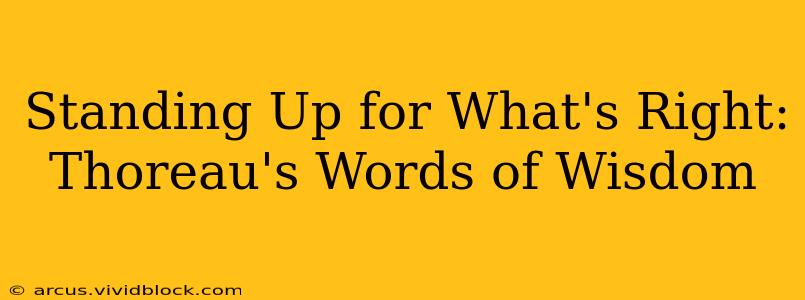Henry David Thoreau, a transcendentalist writer and philosopher, wasn't just a hermit who lived by Walden Pond. He was a passionate advocate for civil disobedience, challenging societal norms and inspiring generations to stand up for their beliefs. His enduring legacy rests on his powerful words, urging us to live authentically and fight for what's just. This exploration delves into Thoreau's wisdom on standing up for what's right, examining his philosophy and its enduring relevance in today's world.
What is Civil Disobedience, According to Thoreau?
Thoreau's essay, "Civil Disobedience," is a cornerstone of philosophical and political thought. He argues that individuals have a moral obligation to disobey unjust laws. This isn't about anarchy; it's about conscientious objection—a refusal to comply with laws that violate one's conscience. For Thoreau, the true measure of a government is not its power, but its morality. An unjust government, he claims, loses its legitimacy and deserves resistance. This resistance, however, should be peaceful and principled, focusing on moral persuasion rather than violence.
How Did Thoreau Practice Civil Disobedience?
Thoreau's beliefs weren't merely theoretical. He lived them. His famous refusal to pay the poll tax, a tax that funded the Mexican-American War (which he vehemently opposed), led to his brief imprisonment. This act of defiance, meticulously documented, became a powerful symbol of his commitment to his principles. He wasn't merely protesting the war; he was protesting the government's complicity in what he saw as an unjust and immoral conflict. His incarceration, far from being a defeat, became a testament to his unwavering conviction.
What Inspired Thoreau's Commitment to Civil Disobedience?
Thoreau's philosophy was deeply rooted in his transcendentalist beliefs. He believed in the inherent goodness of humanity and the importance of individual conscience. He was profoundly influenced by thinkers like Ralph Waldo Emerson, who emphasized self-reliance and the importance of living authentically. Witnessing the injustices around him, particularly slavery and the war with Mexico, fueled his commitment to actively opposing what he saw as moral wrongs. His experiences further solidified his belief in the power of individual action to challenge systemic injustice.
Why is Thoreau's Philosophy Still Relevant Today?
Thoreau's ideas resonate powerfully even in the 21st century. We continue to face injustices—from systemic racism and inequality to environmental destruction and political corruption. His call for conscientious objection remains a vital tool for challenging oppressive systems and promoting positive change. His emphasis on peaceful resistance offers a powerful alternative to violence and hatred, reminding us that change can be achieved through thoughtful action and moral persuasion. The core message of his work encourages active citizenship and a commitment to living according to one's conscience.
What are Some Modern Examples of Civil Disobedience Inspired by Thoreau?
The legacy of Thoreau's "Civil Disobedience" is evident in countless modern movements. The Civil Rights Movement in the United States, drawing heavily from Thoreau's philosophy, employed nonviolent resistance to challenge segregation and achieve racial equality. The anti-apartheid movement in South Africa, similarly, utilized peaceful protest and civil disobedience to dismantle the oppressive regime. Even contemporary environmental activism, often involving acts of civil disobedience like protests and boycotts, is directly influenced by Thoreau's ideas on standing up for what's right.
How Can We Apply Thoreau's Principles in Our Daily Lives?
Thoreau's teachings aren't just for grand, historical moments. They can be applied in our daily lives. This might involve speaking out against injustice in our communities, refusing to participate in unethical practices at work, or supporting organizations fighting for social and environmental justice. It's about making conscious choices that align with our values and refusing to compromise our integrity. It's about being active citizens, not passive observers. The act of standing up for what's right, however small it may seem, is an act of defiance and a contribution to a more just world. It’s about living a life of meaning and purpose, guided by conscience.
By understanding and applying Thoreau's wisdom, we can each contribute to a more just and equitable world, one principled stand at a time.

